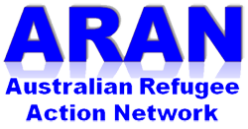Speaking Up for Refugees social media campaign
This campaign is running from 18 May to 20 June 2020.
Refugee Week events can also be found on the ARAN Events page.
Please join the campaign by liking or following the Speaking Up for Refugees Facebook page and share posts, ideally with a short additional comment.
Also, create your own posts. If you do please:
• use at least one of the following hashtags (in combination with a topic specific hashtag if you wish) #justice4refugees #NobodyLeftBehind #GameOver,
• develop posts in line with the weekly themes (see below); feel free to use any images or information on this page or other relevant material,
• feel free to download and use any of these meme templates:
[table “18” not found /]
However, you will need to edit them in a graphics program or by using the simple-to-use online Canva graphic design platform. Please note: minimise the information you supply when signing up for this site and use a unique password.
Now, follow this week-by-week guide for your social media activity over
the next few weeks:
[table “16” not found /]
[table “17” not found /]
May 18-24: Refugee Stories
Online actions
Post a message on your favourite social media platform
Please include these key messages in your posts
Personal stories:
• Refugees are people with the same aspirations and feelings as ourselves,
• Some refugees arrive with family members, many arrive alone,
• Refugees come from many different countries and circumstances; some are
university-educated and some not had much schooling,
• Many great Australians come from refugee backgrounds,
• People who arrive seeking to be recognised as refugees (people seeking asylum)
have been forced to leave their homes due to war, or political persecution
because of their beliefs, ethnicity, for example the Tamil minority in Sri Lanka
and Rohingans in Burma/Myanmar
• Some people become stateless because their countries take away their
citizenship, for example in Bhutan, or Bedouins in the Middle East. People who
are stateless have no rights as citizens and may be denied education,
employment and civil rights.
Injustices we want righted and changes we want to see:
• After World War Two the UN Refugee Convention was agreed to by Australia and many other countries so that people who were persecuted could escape to other countries where they had the right to ‘seek protection i.e. to be recognised as refugees and given permanent visas and citizenship in that country,
• By providing refugees with only temporary visas ( not permanent visas), the Australian Government is not providing refugees with the safe and secure future they need.
Make a phone call: Let Them Go Home To Biloela
Call Minister Alan Tudge on (02) 6277 7790. For background to inform your call read this Guardian Australia storyand the Unsung Hero Award below.
Also sign this change.org petition.
Material for posts on social media
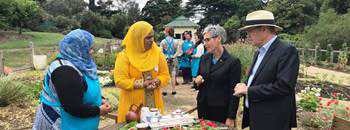
The Peace and Prosperity Kitchen Garden Program involves women visiting Victoria’s Government House weekly, to take part in activities such as cooking, gardening and handicrafts, as well as enjoying tours of the House and garden.
The kitchen garden program for women of migrant and refugee backgrounds is sponsored by the Governor of Victoria, the Hon. Linda Dessau AC, and her husband Mr Anthony Howard QC, as part of their vision to open up Government House and its grounds to the Victorian community. There’s more about this program in this YouTube video.
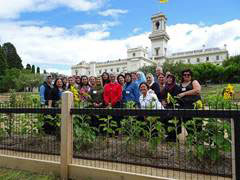
Successful Community Sponsorship of refugees in Canada
Community sponsorship brings diversity and valuable skills into communities. It provides newcomers with an established network, helping them adapt to their new life and make friends more easily. Canada has had a successful private sponsorship scheme in place for almost 40 years. Together Canadians have welcomed approximately 300,000 refugees, in addition to the country’s regular humanitarian intake. Anything that brings refugees into communities rather than detention should be applauded.
If you want to learn more about how Australia could move into this direction read and sign the petition by Amnesty and the CRSI coalition. Also, view this Want to sponsor a refugee? Some words of advice video on youTube with comments from people on “how to welcome a refugee”.

Rural Australians for Refugees nominates Angela Fredericks for the May Unsung Hero Award – a ‘how-to’ for new campaigners
Angela is a social worker in Biloela, Central Queensland. She is a friend of the Tamil asylum seeker family, Nades, Priya, Kopica and Tharunicaa, who have lived and worked in Biloela for years. In March 2018, they were taken from their home by Border Force officers and put in detention in Melbourne. Angela reacted quickly and started to fight for the safety of her friends.
She admits to having no idea what she was doing when she launched the “#HometoBilo” campaign. Now over two years later she has learnt what it takes to lead a small town’s fight into the national arena, changing the hearts and minds of many along the way. She has learnt how to use social media, how to mobilise hundreds of thousands of supporters around the country, how to explain the affection this small town has for this quiet family who simply seek safety and a place to raise a family and contribute to Australia.
The campaign #HometoBilo is not over yet. Yet Angela maintains her positive, energetic outlook and keeps close to the family, now isolated on Christmas Island. She keeps her supporters close to this family. She keeps us active and showing our support, and how we want the Government to use its discretion to bring this family home.
Thank you Angela! Support her and her wonderful work at www.facebook.com/solidaritywithBiloela: #RARUnsungHero #HometoBilo
https://www.ruralaustraliansforrefugees.org.au/unsunghero/
Subscribe to the Kaldor Centre newsletter: https://www.kaldorcentre.unsw.edu.au/join-kaldor-centre-mailing-list
The Kaldor Centre is leading the way on principled refugee law and policy reform in Australia. Through rigorous legal analysis, comparative approaches, and an ability to understand contemporary challenges within the broader historical context, the Kaldor Centre adds depth and breadth to the debate, including by proposing alternative policy approaches.
As a trusted voice on international refugee law, the Kaldor Centre plays a vital role in developing legal, sustainable and humane solutions for displaced people around the world.
There’s more about the Kaldor Centre in this YouTube video.
Create your own posts using one of these links :
• Cate Blanchett interviews a Syrian refugee in London who becomes an award winning cheese-maker.
• Cate Blanchett performs the rhythmic poem What They Took With Them with Keira Knightley, Juliet Stevenson, Peter Capaldi, Stanley Tucci, Chiwetel Ejiofor, Kit Harington, Douglas Booth, Jesse Eisenberg and Neil Gaiman.
• Every voice counts. Every action counts. Everyone Counts.
View this UNHCR video #EveryoneCounts.
Refugee Stories – The new humans of Australia facebook page:
Shaqaeq’s family is originally from Afghanistan but after the Taliban took control and began their genocide of the Hazara people, her father came to Australia by boat; three years later at the age of 12, she was sponsored and arrived in 2013. Read more on Facebook.
Fadak’s father arrived in Australia by boat, escaping the Saddam Hussein regime in Iraq. At age 11, after being sponsored, she arrived here in 2003.
Read more on Facebook.
Alia did a Bachelor degree in Psychology, which was quite unusual for a Hazara girl in Quetta (Pakistan) at that time. She married and had four children but her husband was threatened by the Taliban and extremists. While visiting her eldest daughter who was studying in Australia, they decided to stay and apply for a protection visa. Read more on Facebook.
Find out more about refugees in Australia on the
Refugee Council of Australia website.
Australia’s refugees timeline:
This timeline sets out Australia’s history of refugee policy and key events in Australia’s treatment of refugees. It is a selection of major events affecting refugees and people seeking asylum in Australia, drawn from official sources and media reports. Learn more about the events and the timeline on the Refugee Council of Australia website.
Return to the top of the page.
May 25-31: Income issues for people seeking
asylum seekers
Act now on the lack of income support for people who are seeking asylum.
Online actions
• Email the Federal Treasurer: tell him that no-one should be left with no income; extend JobSeeker and Job Keeper to provide for people on temporary visas, including people who are seeking asylum.
Email: josh.frydenberg.MP@aph.gov.au
• Email or call the Minister for Families and Social Services Anne Rushton: Tell her that no-one should be left with no income; extend JobSeeker and Job Keeper to provide for people on temporary visas, including people who are seeking asylum.
Send her this message via the Asylum Seeker Resource Centre Email the Senator page: https://action.asrc.org.au/email_senator_ruston or email the Minister direct: senator.anne.ruston@aph.gov.au
• Email other politicians: find out who they are on our
letter writing page contacts section
• Sign the Asylum Seeker Resource Centre (ASRC) petition to protect people seeking asylum and refugees in COVID-19 crisis.
Material for posts on social media
In addition to your emails to politicians, regularly post on your favourite social media platform(s). Here’s what to add:
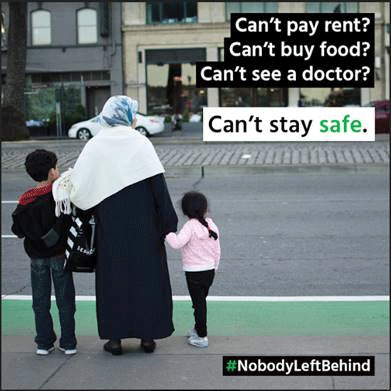
Use any of the following points with a relevant image, pointing out that people on Bridging Visas are not eligible for Centrelink payments:
• Having no income means spending almost all day going from place to place to find food,
• A father and his teenage daughter lived for the past month on baked beans because they had no income,
• I am an asylum seeker and now I have no friends because I borrowed from all of them because I have no job and no income because I am not eligible for any assistance from Centrelink,
• Thanks for the food. Now I can buy nappies for the baby with the money I still have,
• We live in a house with three other families. Our two year old has terrible hearing problems and she screams all day. The other families say we must leave. We have no money.
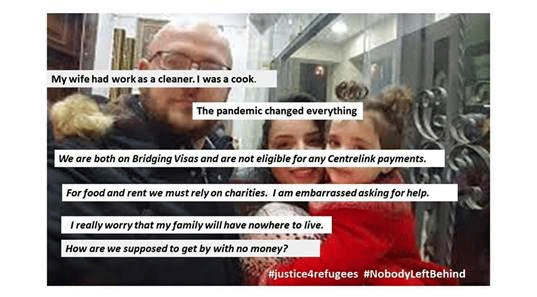

The Migrant Workers Centre is advocating for people who are seeking asylum on Bridging Visas who have insecure work and cannot claim Centrelink benefits. Here are some of the stories you can pass on in your social media posts:
• I arrived in Australia as a refugee from Iraq eight years ago, but still only have a Bridging Visa. I have a wife and children who are 14 and 8. I was working in hospitality but I lost my job because of Covid 19. Like thousands of others on temporary visas I do not qualify for any income support from the Government. My family in Iraq helped us with rent money for one month but they couldn’t do any more. A community group have paid our rent and bills for this month and will pay for two more months. They also gave us food and some vouchers. After that I don’t know what will happen to us,
• We came from Iran in 2013. We spent several months in detention and since then we have lived in the community. We have not had an interview with immigration yet. My husband has worked in meat works. He cut his finger late last year and he can’t work. We have not been able to pay the rent since January. One of the community groups who help people like us have paid the rent and bills for two months. My daughter is in Year 12 and she had a laptop that was 5 years old and then it wouldn’t go at all. Luckily the group helping us was able to get her a new laptop. Otherwise she would not be able to complete Year 12. I don’t know how we will pay the rent next month,
• I am from Sudan. I was sent to Manus Island and into detention there for five years. I became very sick and was brought to Australia in 2018 for medical treatment. I have been working, usually part time since not long after I arrived. Mainly I worked as an Uber driver. Then suddenly in March this work stopped. I am still on a Bridging Visa and I cannot pay my rent. I am very worried that I will end up on the street.
Two more links to use in your posts:
• View this video and use this link in your posts: a Refugee Advocacy Network (RAC) Canberra video on income support issues:
http://www.refugeeadvocacynetwork.org.au/wp-content/uploads/2020/04/IMG_2008.mp4
• Read this story and use the the link in your posts: Working with refugees as a volunteer doctor has made me appreciate my good fortune Ranjana Srivastava. (The Guaridan Australia) 13 May 2020
https://www.theguardian.com/commentisfree/2020/may/13/working-with-refugees-as-a-volunteer-doctor-has-made-me-appreciate-my-good-fortune

The people in need:
• People on Temporary Protection Visas (TPVs) and Safe Haven Enterprise Visas (SHEVs) are eligible for a Special Benefit from Centrelink; this is the equivalent of the Job Seeker allowance. Even if they have been working for more than twelve months, they are not eligible for JobKeeper,
• People who are on Bridging Visas.
The injustices and the changes we want to see:
• People on TPVs and SHEVs are eligible for Special Benefit from Centrelink, which is equivalent to Job Seeker. However, where eligible, they should receive the higher JobKeeper payment,
• Around 30,000 people who are seeking asylum are on Bridging Visas. Some of these people have had the right to work but they usually get poorly paid casual work because they do not have permanent visas. Many have lost their jobs due to the Covid-19 pandemic. Most are not eligible for Centrelink payments and have no income,
• Some people receive the Status Resolution Support Services (SRSS) payment (which is less than the old Newstart) but many have had these payments ended.
So how do they survive?
By relying on charities and the kindness of strangers.
Everyone needs a basic income to pay rent and buy food. This is a basic human right.
Read this media story:
Working with refugees as a volunteer doctor has made me appreciate my good fortune (The Guardian) 13 May 2020.
Read this report:
The National Refugee-led Advisory & Advocacy Group (NRAAG) Consultation Outcomes Report (NRAAG) 6 May 2020.
Watch this video:
Demand Medicare & Income Support for all (Refugee Advocacy Network – RAN) May 2020.
Create your own posts using one of these links :
• Cate Blancett interviews a Syrian refugee in London who becomes an award winning cheese-maker.
• Cate Blanchett performs the rhythmic poem What They Took With Them with Keira Knightley, Juliet Stevenson, Peter Capaldi, Stanley Tucci, Chiwetel Ejiofor, Kit Harington, Douglas Booth, Jesse Eisenberg and Neil Gaiman.
• Every voice counts. Every action counts. Everyone Counts.
View this UNHCR video #EveryoneCounts.
Return to the top of the page.
June 1-7: Detention – and need for fair processes and permanent protection
Online actions
Don’t allow Minister Dutton to take away their lifeline
Mobile phones are a lifeline for refugees and people seeking asylum. Having refused to ensure the safety of refugees and people seeking asylum in overcrowded conditions in immigration detention during the coronavirus pandemic, Dutton now wants to give Australian Border Force more powers, including the ability to confiscate mobile phones.
Not only would these changes take away that accountability and transparency, it would rip away refugees and asylum seekers access to their families, loved ones, legal representation and the outside world. This is yet another example of the Morrison Government trying to distract from the most pressing issue – that they are detaining hundreds of innocent people – refugees and people who are seeking asylum – and there is no plan for their release.
This is not the kind of Australia we want. #GameOver #FreetheRefugees
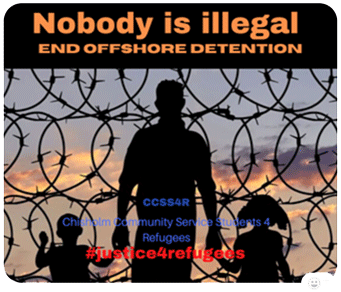
Material for posts on social media
The Indefinite Sleep Out
300 days of sleeping out and more to go to shed a light on the inhumane conditions of refugees living in indefinite detention. Speaking up for Refugees often means meaningful and powerful actions like this one.
Follow the story of doctors giving up their comfortable beds to fight for justice for refugees on their Facebook page
Read the SBS Story.
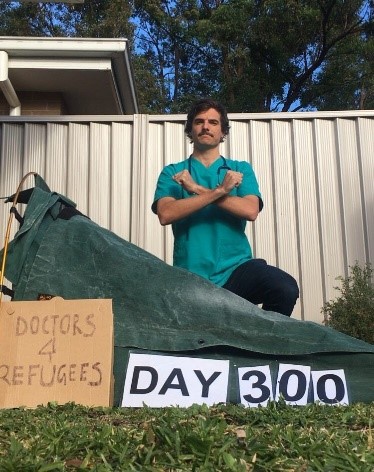
Share this Manus to Mantra post on Facebook.
Eaten Fish
Ali Dorani, known by his nom de plume Eaten Fish came to Australia seeking our protection. He was on held in detention on Manus island (PNG) for more than four years, with hundreds of other young men who our government locked up in detention just because they came wanting safety and freedom in Australia.
Like others Ali suffered the effects of indefinite detention including poor physical and mental health. Dorani was freed due to the efforts of Victorian poet and refugee advocate, Janet Galbraith and the Cities of Refuge Network, a group which offers long-term residencies to writers and artists who face persecution because of their work.
In 2016 Cartoonists Rights Network International awarded Dorani the Courage in Editorial Cartooning – they also played a major role in advocating for Doranis’s freedom.
Ali Dorani (Eaten Fish) now lives in Norway and works as an artist. #justice4refugees #GameOver #FreeTheRefugees

Poem from Behind Closed Doors.
This poem by a refugee who was held on Manus Island for years and is now here in Australia – in immigration detention, with no end in sight.
“I dedicate this poem to the Manus Island detainees who have lost their lives. We have them all in our minds and will never forget them.”
Expectations
Hey, Freedom.
You are not colour
You are not smell.
You are not shadow.
You are not sunshine.
You are absolute darkness for me,
with no beginning or end.
In which part of the world can I find you?
If someday you pass though this city
tie a red scarf around your neck
so I can recognize you.
I’ll sit on the train tracks waiting
for you to descend.
Hey, Freedom,
I don’t know what you are.
But I whisper your name like a lost child.
Freedom, set me free from this prison!
This prison made by fellow human beings.
Hey, Freedom,
I am a rain drop
waiting to join the sea.
Hey, Freedom,
look how my brain is frozen.
A spider web has surrounded my thoughts.
Smoke and dust sit on my mind;
my heart is surrounded by hatred.
They made a cage in my throat —
But they left this voice and enough breath to speak my truth.
If you come to this country someday
you will pass through a city of blood.
If you saw all the blood on the ground
you would never return, from fear.
We accept death just like life here:
we see no difference between water and blood.
Hey, Freedom,
tell me about windows that open to gardens.
Tell me about the singing of birds.
Tell me about the dancing of butterflies.
Tell me about the playing of fish.
Look how I forget these simple, everyday things!
Hey, Freedom,
I will not sit waiting for you.
You have killed my hope.
You have destroyed my goals.
You did not show mercy to my friends —
You led them to their deaths.
You made men sick by searching for you and killed them.
You hung and murdered others.
You pushed another into the river to drown.
You hit a stone on some poor man’s head and ended his life too.
Is this the meaning of freedom for you?
Hey, Freedom,
I’ve accepted my death here.
For years the ceiling of my room has been my sky.
Take my life and set me free.
I’m fed up with dying every single second.
Pour my blood into the veins of my country — I don’t want my blood to dry beside my bones.
I had hoped to see my mother again one day:
but the dandelions have told me she is dead.
Return to the top of the page.
June 8-14: Offshore – PNG and Nauru
Online actions
Bring Priya, Nades and their girls home to Biloela
11 June 2020
Happy 3rd Birthday to our incredible Tharunicaa!
Send her birthday card to Minister Tudge.
There’s more on Facebook
Material for posts on social media
How much does it cost to keep asylum seekers in detention?
(ABC The Weekly) 10 June 2020
Facebook Video
Reflecting on this Refugee Week
(Eureka Street) 11 June 2020
This year Refugee Week has been swallowed by the disruption caused by COVID-19 … It becomes all the more important to reflect on the world of which refugees are part and why their lives matter to us.
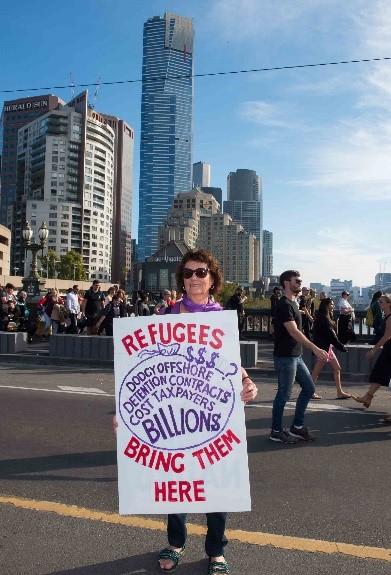
Refugees’ Offshore Limbo must end
The Australian Government has spent huge amounts (around $5 billion) on the ‘offshore’ arrangements, which have seen over 3,000 people who came here for safety sent off to PNG and Nauru. Kids developed resignation syndrome, hundreds developed mental illness and other serious health issues. The Australian Government spent millions of dollars in legal cases to prevent people from being brought here for medical treatment. 12 people died unnecessary deaths.
In 2014, the Australian Government made an agreement with Cambodia to resettle refugees there (one of the poorest countries in the world). This agreement cost the Australian Government $15.5 million for direct resettlement costs and $40 million over four years. That’s a total of $53.5million. Seven refugees moved to Cambodia; by June 2019 only three refugees were living in Cambodia.
Sign the Game Over petition: #GameOver #FreeThe Refugees #justice4refugees
After 6 years imprisoned in PNG by the Australian Government
Behrooz Boochani is now free in New Zealand. Every day he reflects, and remembers those still in PNG, on Nauru, and those detained in Australia.
“My experience on Manus is like an ongoing nightmare – what felt like years of struggling to crawl out of a pit…”. Read and share Behrooz’s article in The Age.
Hundreds are still held in offshore detention on Nauru and in PNG
Seven years, 13 deaths and untold despair. 200 people brought here for medical treatment now imprisoned in two hotels for six months. This must end.
Sign the Game Over petition.
Share this Manus to Mantra post on Facebook.
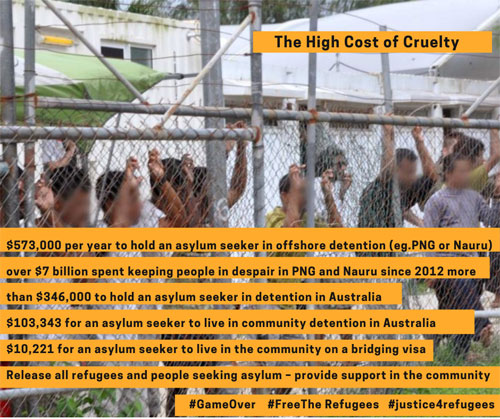
Return to the top of the page.
June 15-20: Refugee Week
Online actions and posts on social media
Refugee Week events and actions can be found on the
ARAN Actions – Refugee Week page.
Media stories and media releases
Find inspiration for your posts and other social media activity from the stories and information on the ARAN website’s Recent News and Media Releases page.
